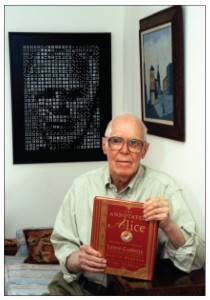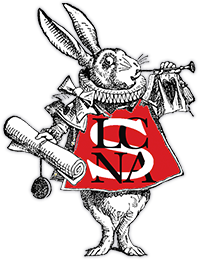 With great sadness we note the passing of Martin Gardner this past Saturday, May 22, 2010, in Norman, Oklahoma at the age of 95. Martin Gardner was not only a founding member of the Lewis Carroll Society of North America but also, it is surely safe to say, the founder of serious Carroll studies through the publication of his book The Annotated Alice. That work, which went through three editions (The Annotated Alice, 1960; More Annotated Alice, 1990, and The Annotated Alice: The Definitive Edition, 2000) introduced countless numbers of people to Lewis Carroll’s Alice, thereby bringing Carroll’s works to the popular mind as never before. His Annotated Alice also set the standard, one seldom equalled, for a numerous succession of annotated works by other authors. In 1962 he published his Annotated Hunting of the Snark, reprinted in 2006 in an expanded, definitive edition with a brilliant introduction and appreciation by Adam Gopnik.
With great sadness we note the passing of Martin Gardner this past Saturday, May 22, 2010, in Norman, Oklahoma at the age of 95. Martin Gardner was not only a founding member of the Lewis Carroll Society of North America but also, it is surely safe to say, the founder of serious Carroll studies through the publication of his book The Annotated Alice. That work, which went through three editions (The Annotated Alice, 1960; More Annotated Alice, 1990, and The Annotated Alice: The Definitive Edition, 2000) introduced countless numbers of people to Lewis Carroll’s Alice, thereby bringing Carroll’s works to the popular mind as never before. His Annotated Alice also set the standard, one seldom equalled, for a numerous succession of annotated works by other authors. In 1962 he published his Annotated Hunting of the Snark, reprinted in 2006 in an expanded, definitive edition with a brilliant introduction and appreciation by Adam Gopnik.
Like Lewis Carroll, Martin Gardner had a deep appreciation for serious and recreational mathematics [he wrote the famous “Mathematical Games” column in Scientific American for 25 years with more than a few touching on Carroll], a love of language and paradox, and a profound interest in religion. Like Houdini, he was keen on magic tricks and equally intolerant of paranormalists and other charlatans.
Martin was always willing to help those who corresponded with him and, although some of us never had the privilege of meeting him, we all knew him and counted him both a learned guide and an always generous friend.




My first encounter with Lewis Carroll has begun not with «Alice», but with his «Symbolic Logic». In the early 70s there was a book was released by the publisher «Mir» (World) in a series devoted to popular mathematicians. Also, the first book in my collection from this series was «Mathematical puzzles and entertainments» by Martin Gardner (the others were «New Mathematical Diversions» and «The Ambidextrous Universe»). Therefore, later on, when I had come across Alice with Gardner’s comments, it was as if I was reunited with two old friends.
I believe the first read should be of the pure, original text without comments – then the second reading with comments will be a real delicacy. Martin Gardner’s comments don’t turn Alice into a boring academical read, instead it makes the reading of «Alice» clearer, and enlightens the reader with some special epoch-consumed details and circumstances, historical and cultural references, and consequently widens the reader’s view. He never pushed his own opinion onto the reader, but provided the reader with all the relevant materials to help them to make their own. It is a brilliant example of how correct and helpful commentaries could be.
Now, when I’m working on illustrations for the «Snark, I’m grateful that Martin Gardner has commented it too.
Martin Gardner was quite popular in the countries of the former Soviet Union. He was a figure of intellect, reason, and had the respect of the community for the quality of his contributions.
My notes are personal and not reflecting the entire value of Martin Gardner genius – he was the mountain and his heritage is not estimated yet.
You will remain in our memory and hearts Mr. Gardner.
I remember going to spend an afternoon with Martin when he lived in Asheville. He showed us books, did magic tricks, told stories, and I started to think “this must be what it was like to spend time with Lewis Carroll.” We went through all the new annotations for More Annotated Alice and when I got home (laden with a huge pile of books and pamphlets Martin had given me for my collection) and sent him some suggested annotations, he graciously included them, always citing the source. We met on a few other occasions, but I will always remember that “golden afternoon.”
I can think of no one who has brought more common (and sometimes uncommon) sense to the reading of the Alice books. His annotations sparkle with wit, intelligence, and scholarly care.
As a devoted disciple of Martin Gardner, I am reminded of Keats’ “On First Looking into Chapman’s Homer,” in which the poet discovers the dynamic impact of Homer’s world through his reading of Chapman’s translation:
“Then felt I like some watcher of the skies
When a new planet swims into his ken.”
I thank Mr. Gardner for allowing us all to become amazed watchers of the Carrollian skies and to experience “the wild surmise” that lures us deeper into Wonderland.
Charlie, you were very lucky. I joined the Lewis Carroll Society of North America around 1992 or 1994. I can’t remember exactly when. It was always my hope to meet Martin Gardner, but somehow, we never attended the same meetings, or maybe he never attended any meetings after I joined. I have a vast collection of his books, which I used when I was teaching Mathematical Reasoning to college freshman and it was fun to introduce a new group of students each semester to his genius. When I taught “The Logic and Literature of Lewis Carroll” to college juniors, I used his “Annotated Alice” as one of the texts. The first few times that I taught it, I had to scrounge in bookstores to find enough copies for the students because it wasn’t available online. Now, I own many copies and gladly hand them out to friends. Most recently, my 14 year old grand-daughter read “The Annotated Alice” for a freshman book report. I guess that I am rambling, but the name of Martin Gardner brings back so many fond memories. Losing him is like losing an old friend.
You will remain in our memory and brains Mr. Gardner.
One way to remember you (in spanish):
http://e-ciencia.com/blog/noticias/las-matematicas-de-alicia-homenaje-a-martin-gardner/
thank you Martin!!
Never met Mr. Martin Gardner out of a book pages, but to meet him there was enough to love him and owe him a debt of gratitude for the many doors he opened for us over knowledge. He was as light as deep, as amusing as significant. His work will forever accompany us and our students. Thanks, Maestro.
I got hooked on his Scientific American column when I was in college. And he’s part of the reason I became a Lewis Carroll fan – I was a math major and did a term paper on the math and logic in the Alice books.
I always said that my dream job would be to work for Martin Gardner.
I was assigned the “Annotated Alice” Back in 1975. I was overwhelmed by his Take on why the the “Alice” Books came to be. Decided then and there to become a Lewis Carroll Scholar.
So, thank you, Martin.